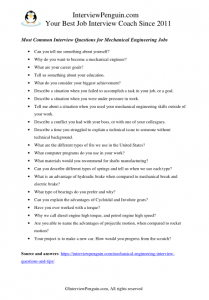A typical interview process for this position consists in three stages:
- Personal questions (interviewers inquire about your education, motivation, goals, and previous working experience in the field).
- Behavioral questions (interviewers try to assess your attitude to pressure, deadlines, conflicts in the workplace, and to other situations that belong to a daily job of an engineer).
- Technical questions (these questions are related to the technical aspect of the job, and the hiring managers ask them to test your real knowledge of mechanical engineering, and readiness for the particular role in the company).
Favorable situation on the employment market
Luckily for you, right now we experience a deficit of mechanical engineers, and companies literally fight for skilled job candidates. (This will likely change in the near future, however, with artificial intelligence making inroads in the industry.)
In many cases you will be the only person they interview for the job, or you will compete with two or three other people for the position (which is nothing compared to managerial positions, or jobs in banks, where one competes against dozens of other job applicants).
Still, even if you are alone, you will have to convince us of your readiness for the job, of the right attitude to work and to other people, and of knowledge of mechanical engineering. Let’s have a look at the questions!
Personal questions – first stage of an interview
- Can you tell me something about yourself? Speak about your experience, background, and your passion for mechanical engineering. You can even talk a bit about your education, and how it prepared you for the role. Mention briefly one or two hobbies from your personal life–this helps to break the ice, and to create a friendly atmosphere in the room (if it’s not relaxed already).
- Why do you want to become a mechanical engineer? Focus on your motivation, passion for this job, and also confidence in your designing and engineering skills. You should also say that you enjoy doing what engineers generally do, and can’t imagine having any other job at this stage of your career. Do not talk about money. Obviously, mechanical engineers earn a lot, and they deserve it. But you should not point out a great salary as a reason for your job choice.
- What are your career goals? You should simply say that you would like to work as a mechanical engineer and develop your experience in the field, specializing in a certain area of engineering. If you are not sure, tell them that you’d like to work on various designs, and will re-evaluate your career plans in few years from now.
- Tell us something about your education. What subjects did you enjoy the most, and the least? How have your studies prepared you for the work of an engineer?
- What are your salary expectations?
Behavioral questions – testing your attitudes and motivation
- What do you consider your biggest achievement? Speak about something unique, not something everyone else has done. Try to talk about designing a machine, or about some interesting improvements you made to a certain design. If you managed to overcome a difficult period in your life–for example a life-threatening illness, you can point it out as well. Difficult times make us stronger, and each employer is aware of that…
- Describe a situation when you failed to accomplish a task in your job, or a goal. Try to be honest, show us that you are aware of your mistakes and failures. Everyone fails sometimes. The difference between great and average employees is that great people will learn from their mistakes, and will move on quickly, ready for the next challenge, not affected by their recent setbacks.
- Describe a situation when you were under pressure in work. Tight deadlines, goals that are difficult to meet, and a boss who expect too much from us–all of that can result in a pressure on a workplace. Narrate a situation when you experienced pressure, a situation that had a happy ending. That means a situation when you eventually overcame the pressure, and it did not affect you negatively in your job. Some people crack under pressure. Other work harder, and better. And some people are simply so relaxed that they do not experience any pressure in job–they just don’t let it in… And what about you?
- Tell me about a situation when you used your mechanical engineering skills outside of your work.
- Describe a conflict you had with your boss, or with one of your colleagues.
- Describe a time you struggled to explain a technical issue to someone without technical background.
- Tell us about an obstacle you overcame.
- Describe a situation when you used logic to solve a problem.
- Give an example of a time when you showed initiative at work.
- Tell us about a time when you had to make a decision without all information you needed.
- Have you ever worked on a project that was a failure?
- …
Special Tip: If there’s one thing many excellent engineers struggle with in the job interviews, it is behavioral questions. I’ve seen many engineers answering these questions with silence, which, of course, cost them their chances, and sometimes a job which would pay them over $100K annually.
If you also find these questions difficult, consider having a look at our Interview Success Package – it offers multiple great answers to all difficult behavioral questions, including answers for people who apply for their very first job. It can be the part of the puzzle you are missing…
3. Technical questions – assessing your knowledge of the field
Mechanical engineering is a technical field, and the interviewers will ask you at least some technical questions.
The difficulty will depend on the person who leads an interview with you, and on their own knowledge of mechanical engineering. It will also depend on the number of people you compete with for the job. To some technical questions belong:
- What are the different types of fits we use in the United States?
- What computer programs do you use in your work?
- What materials would you recommend for shafts manufacturing?
- Can you describe different types of springs and tell us when we use each type?
- What is an advantage of hydraulic brake when compared to mechanical break and electric brake?
- What type of bearings do you prefer and why?
- Can you explain the advantages of Cycloidal and Involute gears?
- Have you ever worked with a torque?
- Why we call diesel engine high torque, and petrol engine high speed?
- Are you able to name the advantages of projectile motion, when compared to rocket motion?
- Your project is to make a new car. How would you progress from the scratch?
Special tip: Many corporations will ask you to complete a mechanical aptitude test, such as Bennett Mechanical Comprehension Test, the Wiesen Test of Mechanical Aptitude, or Ramsay Corporation’s Mechanical Aptitude Test.
If you aren’t sure what these tests are, of how to ace them, check out the Mechanical Aptitude Practice Test from JobTestPrep. With 21 mechanical aptitude practice tests and 1 study guide, you will improve your chances of getting hired significantly. With tests it’s the same story like with everything else in life–the more you practice, the better you get.
Practicing with the interface for several hours, you will get ready to all types of technical questions you may face in your mechanical aptitude test, and easily pass the interview. Do not forget to check it out.
Conclusion, next steps
Technical questions can differ a lot from one interview to another, and they depend on the things the company designs. Alternatively the company may ask you to complete a mechanical aptitude test, which is enough for them to assess your real level of technical skills.
Behavioral and personal questions will be similar every time you interview for a job of a mechanical engineer.
While you will not face a tough competition in this interview (unless you apply for a job with Google, or with General Electric, or other popular employer), you still have to show the hiring managers the value you can bring to their company, and demonstrate your engineering skills.
You can do it with right answers to both technical and non-technical questions.
I hope you will succeed and wish you best of luck!
Matthew
P.S. You can also download a full list of questions in a simple, one page long .PDF document, to practice your interview answers later:

May also interest you:
- Engineering manager interview questions.
- Industrial engineer interview questions.
- Electrical engineer interview questions.

